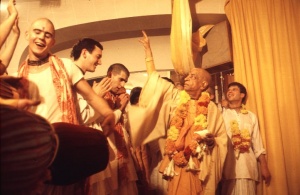CC Adi 17.128: Difference between revisions
m (1 revision(s)) |
No edit summary |
||
| Line 1: | Line 1: | ||
{{ | [[Category:Sri Caitanya-caritamrta - Adi-lila Chapter 17|C128]] | ||
<div style="float:left">'''[[Sri Caitanya-caritamrta|Śrī Caitanya-caritāmṛta]] - [[CC Adi|Ādi-līlā]] - [[CC Adi 17|Chapter 17: The Pastimes of Lord Caitanya Mahāprabhu in His Youth]]'''</div> | |||
<div style="float:right">[[File:Go-previous.png|link=CC Adi 17.127|Ādi-līlā 17.127]] '''[[CC Adi 17.127|Ādi-līlā 17.127]] - [[CC Adi 17.129|Ādi-līlā 17.129]]''' [[File:Go-next.png|link=CC Adi 17.129|Ādi-līlā 17.129]]</div> | |||
{{CompareVersions|CC|Adi 17.128|CC 1975|CC 1996}} | |||
{{RandomImage}} | |||
==== TEXT 128 ==== | ==== TEXT 128 ==== | ||
<div | <div class="verse"> | ||
āra yadi kīrtana karite lāga pāimu | :āra yadi kīrtana karite lāga pāimu | ||
sarvasva daṇḍiyā tāra jāti ye la-imu | :sarvasva daṇḍiyā tāra jāti ye la-imu | ||
</div> | </div> | ||
| Line 12: | Line 16: | ||
==== SYNONYMS ==== | ==== SYNONYMS ==== | ||
<div | <div class="synonyms"> | ||
''āra''—again; ''yadi''—if; ''kīrtana''—chanting of the Hare Kṛṣṇa ''mahā-mantra''; ''karite''—to do; ''lāga''—contact; ''pāimu''—I shall take; ''sarva-sva''—all possessions; ''daṇḍiyā''—chastising; ''tāra''—his; ''jāti''—caste; ''ye''—that; ''la-imu''—I shall take. | |||
</div> | </div> | ||
| Line 19: | Line 23: | ||
==== TRANSLATION ==== | ==== TRANSLATION ==== | ||
<div | <div class="translation"> | ||
“The next time I see someone performing such saṅkīrtana, I shall certainly chastise him by not only confiscating all his property but also converting him into a Muslim.” | “The next time I see someone performing such saṅkīrtana, I shall certainly chastise him by not only confiscating all his property but also converting him into a Muslim.” | ||
</div> | </div> | ||
| Line 26: | Line 30: | ||
==== PURPORT ==== | ==== PURPORT ==== | ||
<div | <div class="purport"> | ||
To convert a Hindu into a Muslim was an easy affair in those days. If a Muslim simply sprinkled water on the body of a Hindu, it was supposed that the Hindu had already become a Muslim. During the transition of the British in Bangladesh during the last Hindu-Muslim riots, many Hindus were converted into Muslims by having cows’ flesh forcibly pushed into their mouths. Hindu society was so rigid at the time of Lord Caitanya that if a Hindu were converted into a Muslim, there was no chance of his being reformed. In this way the Muslim population in India increased. None of the Muslims came from outside; social customs somehow or other forced Hindus to become Muslims, with no chance of returning to Hindu society. Emperor Aurangzeb also inaugurated a tax that Hindus had to pay because of their being Hindus. Thus all the poor Hindus of the lower class voluntarily became Muslims to avoid the tax. In this way the Muslim population in India increased. Chand Kazi threatened to convert the people into Muslims by the simple process of sprinkling water on their bodies. | To convert a Hindu into a Muslim was an easy affair in those days. If a Muslim simply sprinkled water on the body of a Hindu, it was supposed that the Hindu had already become a Muslim. During the transition of the British in Bangladesh during the last Hindu-Muslim riots, many Hindus were converted into Muslims by having cows’ flesh forcibly pushed into their mouths. Hindu society was so rigid at the time of Lord Caitanya that if a Hindu were converted into a Muslim, there was no chance of his being reformed. In this way the Muslim population in India increased. None of the Muslims came from outside; social customs somehow or other forced Hindus to become Muslims, with no chance of returning to Hindu society. Emperor Aurangzeb also inaugurated a tax that Hindus had to pay because of their being Hindus. Thus all the poor Hindus of the lower class voluntarily became Muslims to avoid the tax. In this way the Muslim population in India increased. Chand Kazi threatened to convert the people into Muslims by the simple process of sprinkling water on their bodies. | ||
</div> | </div> | ||
__NOTOC__ | |||
<div style="float:right; clear:both;">[[File:Go-previous.png|link=CC Adi 17.127|Ādi-līlā 17.127]] '''[[CC Adi 17.127|Ādi-līlā 17.127]] - [[CC Adi 17.129|Ādi-līlā 17.129]]''' [[File:Go-next.png|link=CC Adi 17.129|Ādi-līlā 17.129]]</div> | |||
__NOTOC__ | |||
__NOEDITSECTION__ | |||
Revision as of 13:03, 24 July 2021

A.C. Bhaktivedanta Swami Prabhupada
TEXT 128
- āra yadi kīrtana karite lāga pāimu
- sarvasva daṇḍiyā tāra jāti ye la-imu
SYNONYMS
āra—again; yadi—if; kīrtana—chanting of the Hare Kṛṣṇa mahā-mantra; karite—to do; lāga—contact; pāimu—I shall take; sarva-sva—all possessions; daṇḍiyā—chastising; tāra—his; jāti—caste; ye—that; la-imu—I shall take.
TRANSLATION
“The next time I see someone performing such saṅkīrtana, I shall certainly chastise him by not only confiscating all his property but also converting him into a Muslim.”
PURPORT
To convert a Hindu into a Muslim was an easy affair in those days. If a Muslim simply sprinkled water on the body of a Hindu, it was supposed that the Hindu had already become a Muslim. During the transition of the British in Bangladesh during the last Hindu-Muslim riots, many Hindus were converted into Muslims by having cows’ flesh forcibly pushed into their mouths. Hindu society was so rigid at the time of Lord Caitanya that if a Hindu were converted into a Muslim, there was no chance of his being reformed. In this way the Muslim population in India increased. None of the Muslims came from outside; social customs somehow or other forced Hindus to become Muslims, with no chance of returning to Hindu society. Emperor Aurangzeb also inaugurated a tax that Hindus had to pay because of their being Hindus. Thus all the poor Hindus of the lower class voluntarily became Muslims to avoid the tax. In this way the Muslim population in India increased. Chand Kazi threatened to convert the people into Muslims by the simple process of sprinkling water on their bodies.